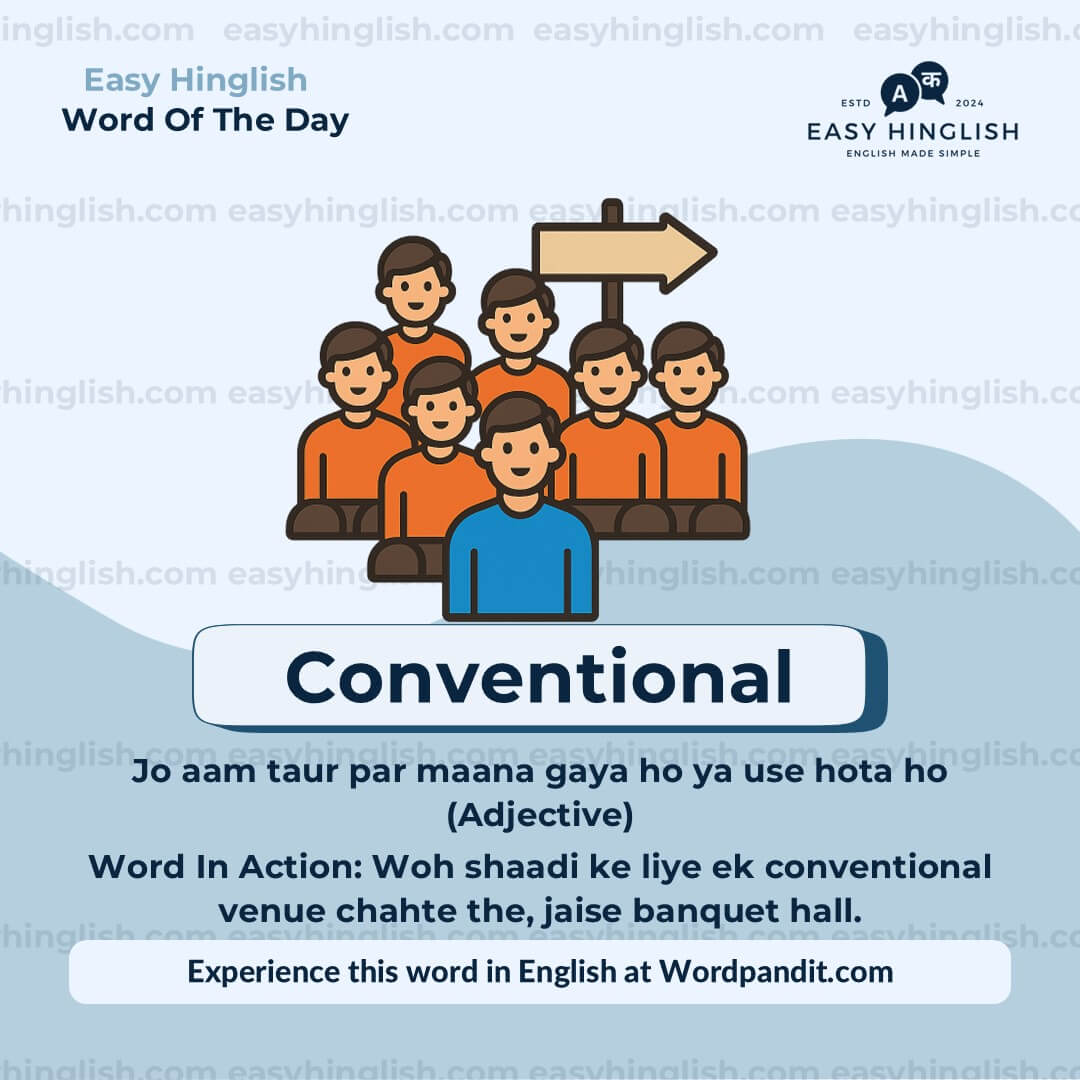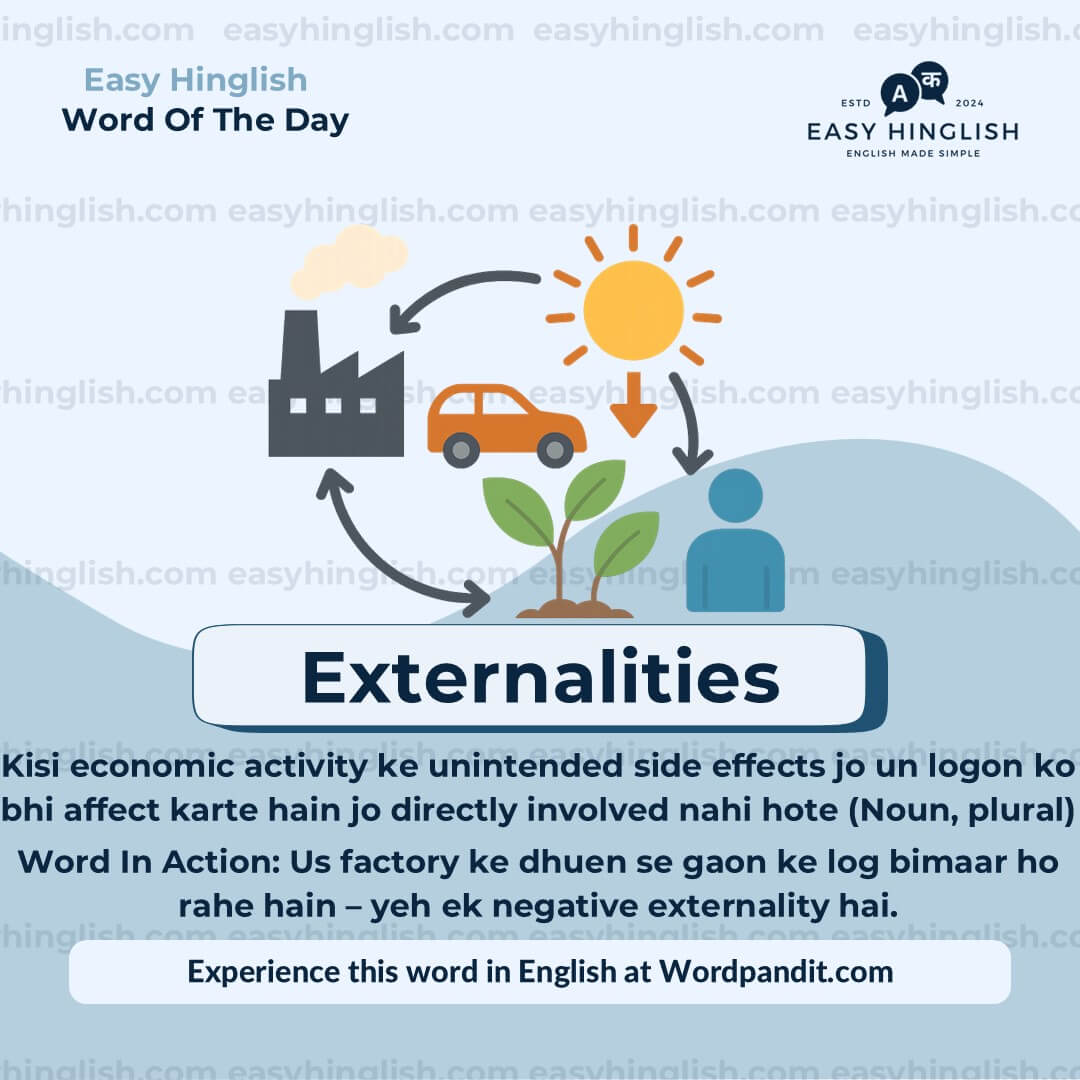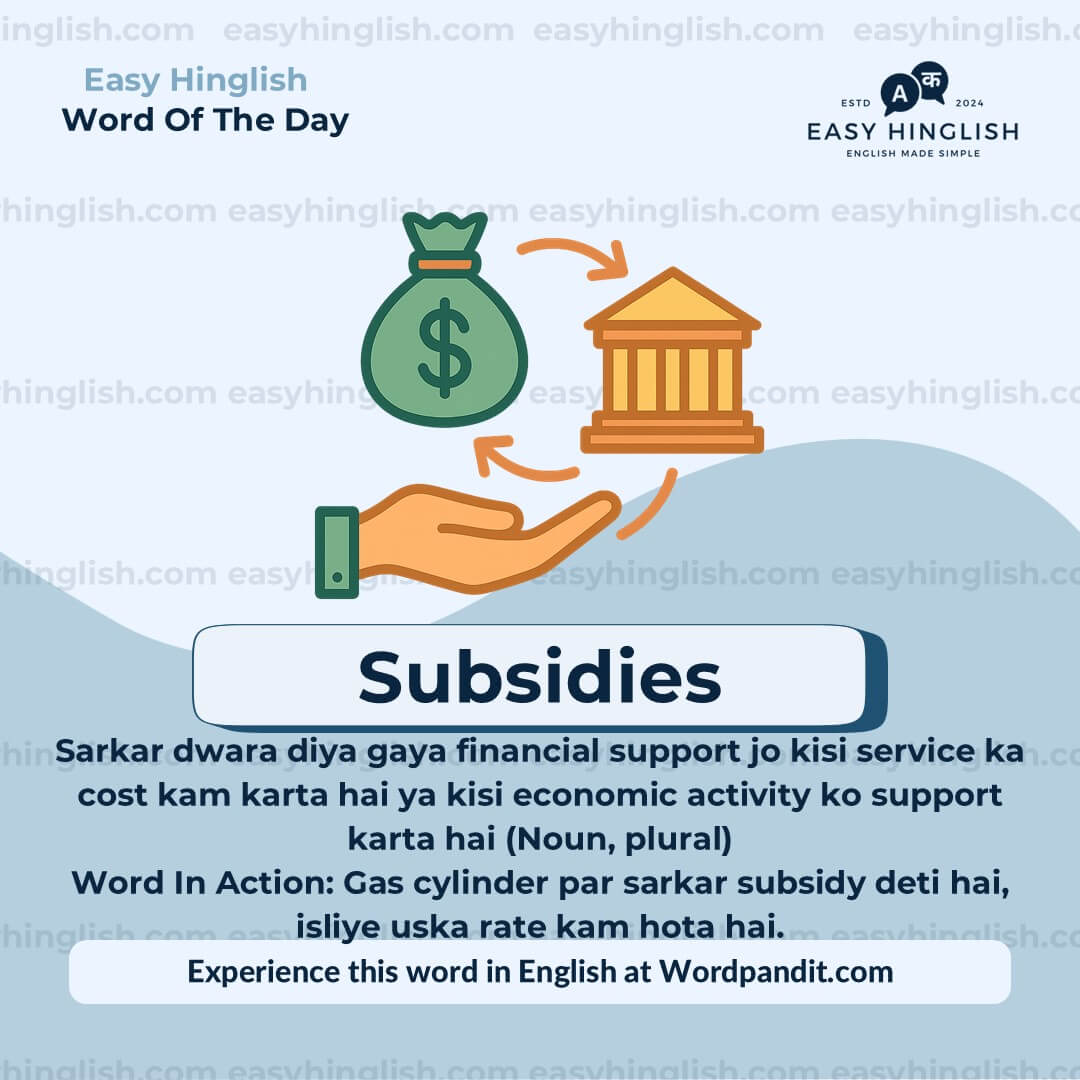Daily Vocabulary Indian Newspapers aur Publications se Seekho
Welcome to Wordpandit ka Indian Vocabulary Hub
Wordpandit par, hum samajhte hain ki ek achhi vocabulary develop karne ke liye local context samajhna bhi zaroori hai. Is section ka focus hai aapke vocabulary ko India ke leading newspapers aur publications se naye shabdon aur phrases ke zariye improve karna, taaki aap practical, relevant, aur uniquely Indian words seekh sakein.
Indian Sources Itne Important Kyun Hain?
Hum maante hain ki kisi bhi language ko sikhne ka sabse best tareeka hai uske local content me immerse hona. Isi wajah se hum carefully words curate karte hain top Indian newspapers aur publications se, jaise:
- The Hindu
- The Times of India
- The Economic Times
- Hindustan Times
- Live Mint
- The Indian Express
- Aur bhi bahut saare...
Hamesha Updated Raho, Hamesha Relevant Raho
Daily updates ke saath, aap Indian news sources se naye words seekhoge jo Indian society aur culture ke latest trends ko reflect karte hain. Hamara focus hai aise words provide karna jo aapke liye real-world me useful ho.
Wordpandit Aapke Learning Goals Ko Kaise Support Karta Hai?
Chahe aap exams ki preparation kar rahe ho, professional communication improve karna chahte ho, ya sirf naye words seekhna chahte ho, Wordpandit har step par aapki madad karega.
Practical Tareeke Se Seekho
Hamari interactive learning methodology me real-world examples, engaging activities, aur context-based usage shamil hain, taaki har naya shabd aapki active vocabulary ka hissa ban sake.
Aaj Hi Indian Vocabulary Seekhna Shuru Karo!
Wordpandit Kyun Choose Karein?
Practical Learning: Aise words seekho jo aapko real-world reading aur communication me sach me kaam aayenge, taaki aapki comprehension aur bolne ki skills improve ho.
Diverse Content: Current affairs se lekar scientific breakthroughs tak, hamare different sources aapko multiple domains ka vocabulary sikhate hain.
Effortless Integration: Wordpandit ko apni daily routine ka part banao. Sirf kuch minute har din dene se aapki vocabulary time ke saath kaafi improve ho sakti hai.
Aapka Vocabulary Mastery Tak Ka Safar
- Regularly hamare Daily Vocabulary section ko visit karo
- Naye words explore karo aur unka context me use samjho
- In words ko apni writing aur bolne ki practice me use karne ki koshish karo
- Jaise-jaise aapke words badhte hain, apni progress ko track karo
Aaj Se Apni Vocabulary Journey Shuru Karo!
Wordpandit ke saath vocabulary improve karna start karo. Roz thoda effort dalne se aap ek strong vocabulary develop kar sakte ho jo academic, professional, aur personal life me kaafi kaam aayegi.
Yaad rakho, ek naya shabd roz seekhna linguistic limitations ko door karne ka best tareeka hai! Wordpandit ko apni daily learning journey ka sathi banao aur vocabulary excellence ki taraf badho!
WORD-1: Conventional
Sandarbh (Context):
"Their practices 'to accurately measure the conventional notion of poverty'." - The Wire
Vyakhya (Explanatory Paragraph):
"Conventional" ka matlab hota hai kuch aisa jo purane tareekon ya accepted norms ko follow karta ho. Agar koi idea ya method "conventional" hai, to iska matlab hai ki woh traditional ya normal tareeke se kaam karta hai — naye aur alag tareekon ke bajaye. Jaise poverty measure karne ka conventional tareeka woh hai jo hamesha se use hota aaya hai, na ki koi naya ya experimental method.
Arth (Meaning): Jo aam taur par maana gaya ho ya use hota ho (Adjective)
Uccharan (Pronunciation): kun-VEN-shun-uhl
Kathinai Star (Difficulty Level): ⭐⭐ Beginner
Utpatti (Etymology): Late Latin *conventionalis* se, jiska root Latin *conventio* hai — matlab "ek meeting ya agreement."
Prashant Sir Ke Tathya (Prashant Sir's Notes):
Yeh shabd essays aur reports mein bahut use hota hai, especially jab hum traditional aur modern approaches ka comparison karte hain. Exams mein yeh values, norms, ya institutions ke context mein aksar aata hai.
Samanarthi & Vipritarthi (Synonyms & Antonyms):
Samanarthi (Synonyms): traditional, standard, ordinary, accepted, mainstream
Vipritarthi (Antonyms): unconventional, innovative, radical, nontraditional, avant-garde
Udaharan (Usage Examples):
- Usne formal dinner ke liye ek conventional black dress pehni thi.
- Conventional wisdom kehta hai ki apni income ka kam se kam 20% bachaana chahiye.
- Uske tareeke shayad unconventional lagte hain, par results ache aate hain.
- Critics kehte hain ki conventional farming environment ko zyada nuksaaan pahunchata hai.
Sanskritik Sandarbh (Cultural Reference):
"Don’t be satisfied with stories, how things have gone with others. Unfold your own myth." - Rumi (yeh quote conventional zindagi ke against jaakar apna unique path dhoondhne ki baat karta hai)
Sochiye (Think About It):
Aise kaunse situations hain jahan conventional thinking progress ko rok sakti hai?
Chhoti Kriya (Quick Activity):
Apne daily routine ke 3 conventional practices likho. Har ek ke samne ek unconventional alternative likho.
Yaad Karne Ka Tarika (Memory Tip):
"Convention" yaani ek meeting jahan log rules pe agree karte hain. "Conventional" matlab wohi cheezein jo unhi rules ko follow karti hain.
Vastavik Jeevan Me Upyog (Real-World Application):
"Conventional" shabd ka use kaafi important hai jab aap debates, essays ya office discussions mein traditional vs modern practices ke baare mein baat karte hain — jaise ki education, economy ya technology mein.
WORD-2: Conspiracy
Sandarbh (Context):
"EU’s 'conspiracy of silence on human rights.' They conclude that the EU and India 'must centre their expanding relationship on human rights and discuss their human rights record' if not, the EU’s growing relationship with India will have 'feet of clay'." - The Wire
Vyakhya (Explanatory Paragraph):
"Conspiracy" ka matlab hota hai ek secret ya chhupi hui planning, jisme log milke kuch illegal ya harmful kaam karne ki scheme banate hain. Jab bade log ya institutions jaankar kisi galat cheez par chup reh jaate hain, to use bhi ek conspiracy maana ja sakta hai. Yahan "conspiracy of silence" ka matlab hai ki EU jaankar human rights violations par kuch nahi keh raha — jaise ki woh chup rehkar indirectly usmein shaamil ho.
Arth (Meaning): Ek chhupi hui planning jisme group kuch galat ya illegal kaam karta hai (Noun)
Uccharan (Pronunciation): kuhn-SPIH-ruh-see
Kathinai Star (Difficulty Level): ⭐⭐⭐ Intermediate
Utpatti (Etymology): Latin *conspirare* se aaya hai, jiska matlab hota hai "saath mein saans lena" ya "secret planning karna."
Prashant Sir Ke Tathya (Prashant Sir's Notes):
Yeh shabd aksar politics, history, aur media mein use hota hai. Kabhi yeh real secret plans ko dikhata hai, aur kabhi baseless theories ko. “Conspiracy of silence” ek strong phrase hai jo critical writing mein impactful hota hai.
Samanarthi & Vipritarthi (Synonyms & Antonyms):
Samanarthi (Synonyms): plot, scheme, collusion, intrigue, secret plan
Vipritarthi (Antonyms): honesty, openness, transparency, truthfulness
Udaharan (Usage Examples):
- Officials ko fraud ke conspiracy mein shaamil hone ke liye arrest kiya gaya.
- Woh maanta hai ki government ki inaction ke peeche ek badi conspiracy hai.
- Is issue par sabki chup ek conspiracy of silence ban gayi thi.
- Leader ke disappearance ke baad kai conspiracy theories saamne aayi.
Sanskritik Sandarbh (Cultural Reference):
"The greatest trick the Devil ever pulled was convincing the world he didn't exist." — *The Usual Suspects* (yeh film conspiracy aur deception ke theme par based hai)
Sochiye (Think About It):
Kya powerful institutions ki chup rehna bhi utna hi haanikarak ho sakta hai jitna unka actively galat kaam karna?
Chhoti Kriya (Quick Activity):
Kisi historical event ke baare mein sochiye jahan conspiracy later proof ho gayi. Uska 2-line summary likhiye jisme "conspiracy" shabd ka istemal ho.
Yaad Karne Ka Tarika (Memory Tip):
"Con" matlab saath mein, aur "Spire" matlab saans lena. Jab log secret mein milke kuch plan karte hain — woh hota hai conspiracy.
Vastavik Jeevan Me Upyog (Real-World Application):
"Conspiracy" ka use hum political scandals, historical cover-ups, ya courtroom dramas mein dekhte hain. Media literacy ke liye is word ka critical understanding zaroori hai.
WORD-3: Silicosis
Sandarbh (Context):
"Several studies link long exposure to construction activities...can cause diseases like cancers, silicosis, lung impairment, and fibrosis." - The Wire
Vyakhya (Explanatory Paragraph):
Silicosis ek dangerous aur aksar irreversible lung disease hai, jo silica dust ke lambe samay tak exposure se hoti hai. Ye dust zyadaatar construction, mining, aur stone-cutting jaise areas mein hoti hai. Jab log is dust ko saans ke saath andar le lete hain, to lungs mein inflammation aur scarring ho jaata hai, jisse breathing mushkil ho jaati hai. Ye bimari dheere-dheere develop hoti hai aur symptoms bahut late dikhte hain, isiliye kaafi baar diagnose hone mein der ho jaati hai.
Arth (Meaning): Silica dust ke lambe exposure se hone wali lung disease (Noun)
Uccharan (Pronunciation): sil-uh-KOH-sis
Kathinai Star (Difficulty Level): ⭐⭐⭐ Intermediate
Utpatti (Etymology): Latin *silica* (flint) + Greek *-osis* (condition); matlab “silica ke karan hone wali condition.”
Prashant Sir Ke Tathya (Prashant Sir's Notes):
Yeh shabd environmental health, workers’ rights, aur occupational safety ke context mein bahut important hai. Dhyan rahe ki yeh ek specific disease hai jo mining, construction, aur industry-related jobs mein hoti hai.
Samanarthi & Vipritarthi (Synonyms & Antonyms):
Samanarthi (Synonyms): dust-induced lung disease, pneumoconiosis, occupational lung disease
Vipritarthi (Antonyms): healthy lungs, normal respiratory function
Udaharan (Usage Examples):
- Kaafi workers ko quartz dust ke exposure ke baad silicosis diagnose hua.
- Agar proper safety measures ho, to silicosis ek preventable disease hai.
- Activists miners ke liye silicosis ke mamle mein compensation ki demand kar rahe hain.
- Bar-bar fine sand particles inhale karna dheere-dheere silicosis ka kaaran ban sakta hai.
Sanskritik Sandarbh (Cultural Reference):
“The slow death of India’s sandstone miners highlights the neglected epidemic of silicosis.” — *Al Jazeera* aur *The Guardian* jaise news outlets ne is disease par in-depth reports ki hain jo developing nations mein common hai.
Sochiye (Think About It):
Jab silicosis preventable hai, to phir bhi itne saare workers isse kyu suffer karte hain?
Chhoti Kriya (Quick Activity):
Do aise occupations ka naam likhiye jahan silicosis ka risk hota hai, aur har ek ke liye ek safety measure likhiye jo risk ko kam kar sakta hai.
Yaad Karne Ka Tarika (Memory Tip):
"Silicosis" = "Silica" + "-osis" (bimari) → Silica dust se hone wali bimari. Sochiye lungs jaise dhire-dhire pathar ke dust se ghut rahe hoon.
Vastavik Jeevan Me Upyog (Real-World Application):
Silicosis ka zikr aksar public health campaigns, labor rights debates, aur construction ya mining industry ke regulations mein hota hai. Occupational health ke awareness ke liye is word ka samajhna zaroori hai.
WORD-4: Externalities
Sandarbh (Context):
"This construction activity, which creates negative externalities by increasing air, noise and water pollution." - The Wire
Vyakhya (Explanatory Paragraph):
"Externalities" ka matlab hota hai kisi activity ke side effects jo dusre logon ya environment ko affect karte hain, bina unka cost us activity mein shamil kiya gaya ho. Ye effects positive bhi ho sakte hain (jaise education se society ka benefit) aur negative bhi (jaise pollution se health ka nuksaan). Is sentence mein construction ke wajah se jo air, water, aur noise pollution ho raha hai—woh sab negative externalities hain jiska burden society uthati hai.
Arth (Meaning): Kisi economic activity ke unintended side effects jo un logon ko bhi affect karte hain jo directly involved nahi hote (Noun, plural)
Uccharan (Pronunciation): ek-ster-NAL-uh-teez
Kathinai Star (Difficulty Level): ⭐⭐⭐ Intermediate
Utpatti (Etymology): Latin *externus* se, jiska matlab hai “bahar ka”—yaani ki kisi system ke bahar hone wale effects.
Prashant Sir Ke Tathya (Prashant Sir's Notes):
Yeh term economics mein bahut important hai—especially jab environmental ya development policies ki baat hoti hai. Positive aur negative externalities ka difference samajhna zaroori hai, kyunki policy discussions aur essays mein yeh concept bar-bar aata hai.
Samanarthi & Vipritarthi (Synonyms & Antonyms):
Samanarthi (Synonyms): side effects, spillover effects, unintended consequences, indirect impacts
Vipritarthi (Antonyms): direct effects, internal costs, contained impacts
Udaharan (Usage Examples):
- Factory ke negative externalities mein toxic paani aur air pollution shamil hain.
- Education ek positive externality create karta hai kyunki society zyada informed ho jaati hai.
- Governments un activities ko regulate karti hain jo harmful externalities create karti hain.
- Carbon emission par tax lagana ek tareeka hai environmental externalities ko address karne ka.
Sanskritik Sandarbh (Cultural Reference):
Milton Friedman ne apni book *Capitalism and Freedom* mein externalities ka zikr kiya tha, aur bataya ki environmental regulations jaise cases mein government intervention zaroori ho jaata hai.
Sochiye (Think About It):
Kya companies ko unke create kiye gaye externalities ke liye legally responsible banaya jaana chahiye—even agar unhe usse direct profit nahi ho raha?
Chhoti Kriya (Quick Activity):
Apne sheher ya colony mein do positive aur do negative externalities identify karo. Har example ko ek line mein explain karo.
Yaad Karne Ka Tarika (Memory Tip):
"Externalities" = "External" yaani bahar wale effects. Socho: koi activity aap kar rahe ho, par uska asar dusre logon par ho raha hai—woh externality hai.
Vastavik Jeevan Me Upyog (Real-World Application):
Policy making, urban planning, aur environment-related decisions mein "externalities" ka concept bahut useful hota hai. Jaise ki pollution tax ya green energy subsidy banane ke liye yeh samajhna zaroori hai ki external costs/benefits kya hain.
WORD-5: Subsidies
Sandarbh (Context):
"The discussions surrounding potential solutions for pollution caused by construction...while ignoring their working conditions, which includes the intergenerational impact on their families, is an indicator that neither are they seen as equal stakeholders, nor are they given anything more than subsistence." - The Wire
Vyakhya (Explanatory Paragraph):
"Subsidies" ka matlab hota hai financial help jo government kisi vyakti, group ya industry ko deti hai—taaki kisi zaroori cheez ka cost kam ho jaaye, ya kisi economic activity ko promote kiya ja sake. Jaise food, fuel, ya farming mein diye jaane wale subsidies. Is sandarbh mein, construction workers ko meaningful subsidies nahi mil rahe—iska matlab hai ki unhe sirf zinda rehne layak sahayata milti hai, growth ya upliftment ke liye nahi.
Arth (Meaning): Sarkar dwara diya gaya financial support jo kisi service ka cost kam karta hai ya kisi economic activity ko support karta hai (Noun, plural)
Uccharan (Pronunciation): SUB-sih-deez
Kathinai Star (Difficulty Level): ⭐⭐ Beginner
Utpatti (Etymology): Latin *subsidium* se aaya hai, jiska matlab hota hai “madad” ya “support.”
Prashant Sir Ke Tathya (Prashant Sir's Notes):
“Subsidies” economic aur governance ka core concept hai. Yeh helpful bhi ho sakti hain aur kabhi kabhi market ko distort bhi kar sakti hain. Exams mein yeh term inequality, agriculture, industry aur welfare schemes ke context mein aksar poocha jaata hai.
Samanarthi & Vipritarthi (Synonyms & Antonyms):
Samanarthi (Synonyms): grant, financial aid, support, allowance, assistance
Vipritarthi (Antonyms): tax, penalty, fine, burden
Udaharan (Usage Examples):
- Sarkar LPG cylinders par subsidies deti hai taaki low-income families cooking fuel afford kar saken.
- Kaafi deshon mein farmers ko agricultural subsidies milti hain taaki food security bani rahe.
- Critics kehte hain ki fossil fuel subsidies environment ko nuksaan pahuchati hain.
- State subsidies ki wajah se hi housing project pura ho paaya.
Sanskritik Sandarbh (Cultural Reference):
“Subsidies often help the poor, but can also enrich the powerful.” — Development economics aur Amartya Sen jaise thinkers ne is topic par in-depth likha hai, especially in equity aur distribution ke sandarbh mein.
Sochiye (Think About It):
Kya subsidies long-term mein logon ko dependent bana deti hain? Unhe kaise design kiya jaaye taaki empowerment ho, na ki dependency?
Chhoti Kriya (Quick Activity):
Apne desh ke do sectors identify karo jahan subsidies milti hain. Har ek ke liye ek benefit aur ek drawback likho.
Yaad Karne Ka Tarika (Memory Tip):
"Subsidies" = Help to *subside* costs. Socho ki jab income kam ho aur kharcha zyada—subsidy us gap ko cover karti hai.
Vastavik Jeevan Me Upyog (Real-World Application):
Subsidies ka knowledge government budget, policy debates, aur welfare programs ko samajhne ke liye zaroori hai. Yeh price, consumption, aur public behavior ko directly influence karti hain.













